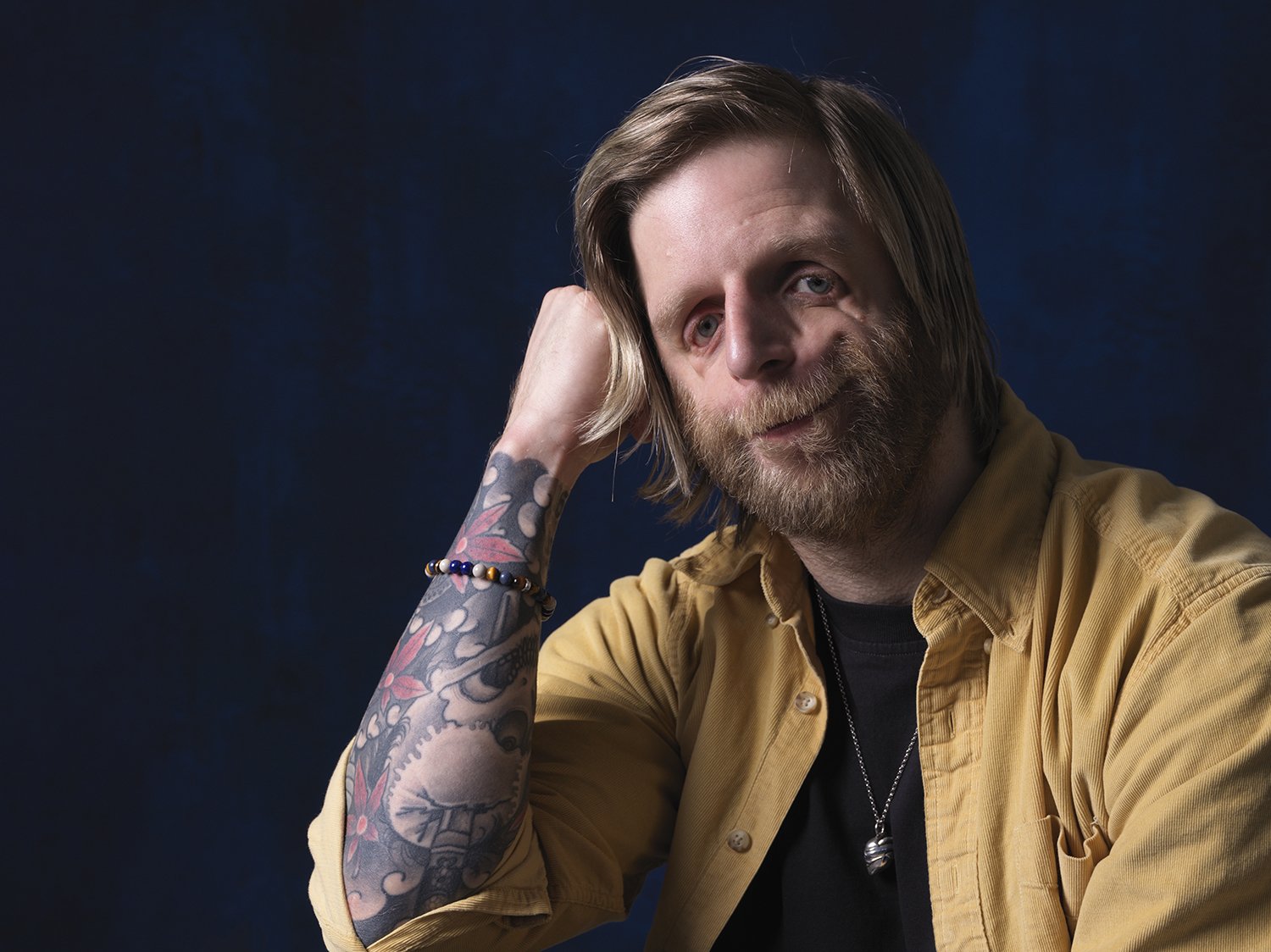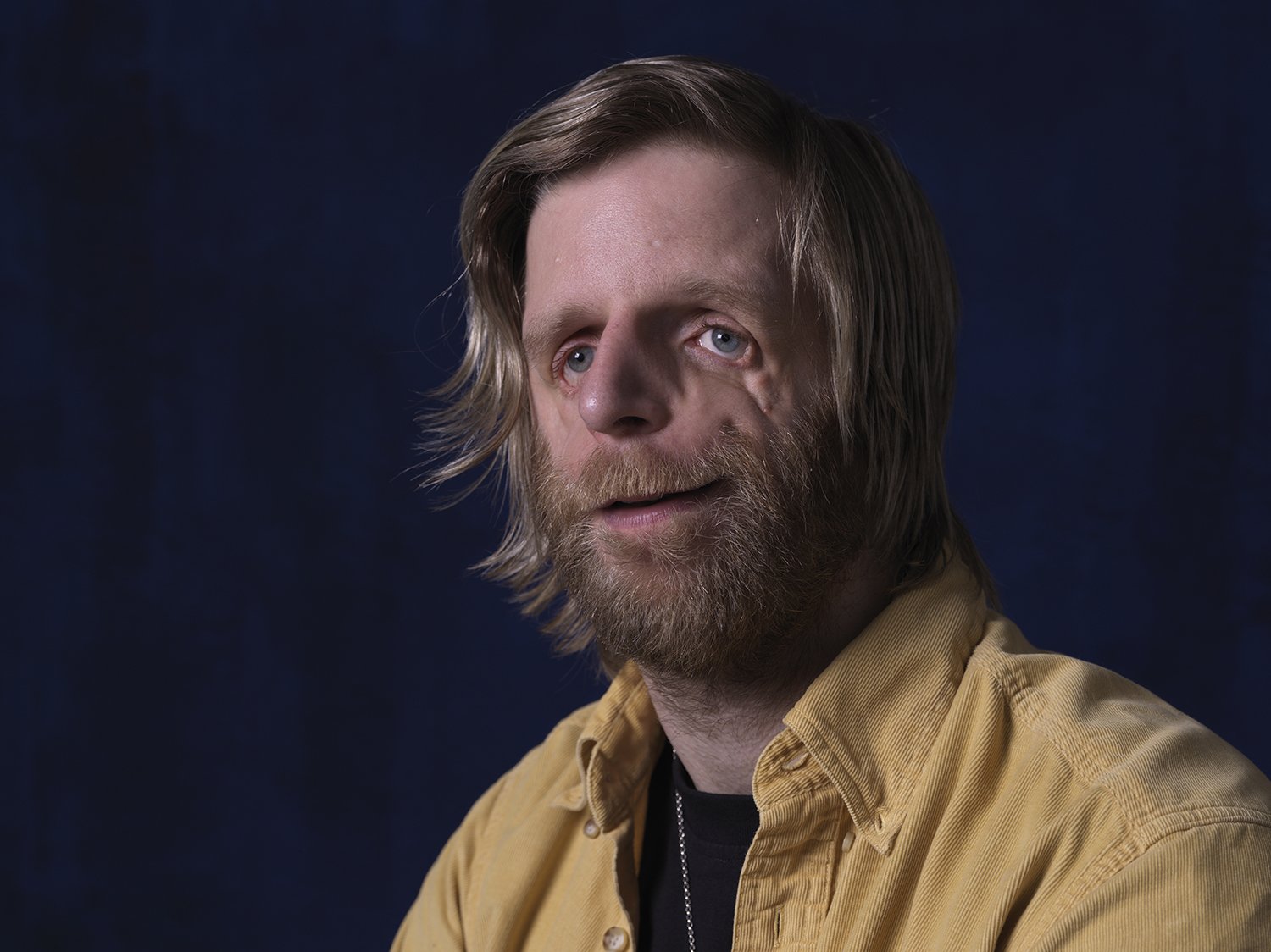Jono
“I still get nervous, but I will always relax my shoulders. I will smile, I will hold my head high. I will interact with people. I'll say ‘hey, how you doing?’ and I'll dress in my own style. I still need breaks and moments to breathe but then I'll go back out again and I'm able to manage that so much more freely. I'm able to enjoy myself. I don’t feel I need to hide anymore.”
Jono Lancaster was born with Treacher Collins syndrome, that causes facial differences. Treacher Collins syndrome is said to affect 1 in 50,000 people. Jono’s birth parents left him at the hospital, but he was formally adopted by his mum, Jean, at the age of five. Living with a positive and protective mother Jono enjoyed primary school and felt comfortable both at home and in public. Upon moving to high school, however, things changed for Jono as fellow pupils began to pick on him for his facial differences. He became more withdrawn and his social life suffered as a result. He shared one example with us of where he really struggled as a teenager.
“Having a haircut was one of the hardest things that I had to do as a teenager. My mum would always say, ‘Jonathan, your hair's getting too long, you need to go to the hairdresser's’. The reason I was scared of going to the hairdressers is because my local hairdresser had one seat in the middle of the hairdressers. All the rest of the seats stood around the outside. You would have to sit in the middle in front of this giant mirror and have your hair cut while everybody else watched. I found it so humiliating.
I thought about it every day at school. I would build myself up, I would just hang out in the street, trying to wait until it got quiet, but it never did. I would eventually go into the hairdresser's, trying not to make eye contact with anybody.
I'd count down until it was my turn and sit on the chair. The hairdresser would try to get an indication of the length and the style I wanted but I didn’t care, I just want to get through it as quicky as I could.
I'd be holding a five pound note in my hand and I could feel all these eyes on me. My palms would be sweating. I worried about the five pound getting damp. The haircut would finish and the hairdresser would get a handheld mirror and say ‘how does it look?’. I would look at it and quickly look away and say ‘that's fine’. I just wanted to get out of the hairdresser's without seeing my face.”
With a driving determination and the help of others Jono has learnt to control the anxiety he felt in his younger years to become a well-respected author, presenter and public speaker. He is now more comfortable in himself and uses his experience and story to influence others and make facial differences more widely accepted.
“Now as an adult, I love having my hair cut. I love having my hair washed and massaged and having a natter with my hairdresser who I absolutely love to pieces. But every now and again, when she gets that mirror and says ‘how does it look?’ I still get nervous and sweat a little but I just tell myself ‘it’s okay’. Being able to enjoy the hairdresser's has been massive for me.”
Jono works across the world to help those with facial differences be more accepting of themselves. Using his experiences to guide others on how to embrace their differences is a constant goal for Jono. Whilst he acknowledges things are changing he feels that mainstream culture could be doing more to help acceptance and equality for those with facial differences.
“Growing up I would see the latest movies and there would be somebody with a facial difference. He'd be the villain or the bad guy, or he'd be the loser. I could never find a positive role model with a facial difference, I could never find a champion or a hero, a sports star, or a musician.
I didn't see that in my community. I didn't see that anywhere. Nowadays, especially on social media, we see people with facial difference just doing their thing, celebrating life. That's amazing to see, but this needs to be replicated on the big screen. These people with facial differences, they don't want these roles out of pity, but if somebody has got talent, it needs to be showcased. When we start to see that on the big screen it just becomes normal.”
Communities can have a huge impact on an individual’s happiness. Individuals with facial differences can feel nervous in communities but everyone can help to make their experiences more positive.
“Community is important for every single one of us. To be able to go out in your street, in your local village, in your local city and say ‘hi’ to the regulars. To see the local dog that you see every morning and interact with and just think is adorable. Being able to walk into your local shop, and your shopkeeper gives you a little bit of banter. Everybody knows that you need community but for people with a visible difference, that community presence can be a lot more challenging. It can be challenging because people with facial differences, might not have that confidence to be able to just step out into the community as their authentic self. The local community can support somebody with a facial difference by just being welcoming, greeting people with a with a smile and getting to know their names.”
Jono works across the world to help those with facial differences be more accepting of themselves. Using his experiences to guide others on how to embrace their differences is a constant goal for Jono. Whilst he acknowledges things are changing he feels that mainstream culture could be doing more to help acceptance and equality for those with facial differences.
“Growing up I would see the latest movies and there would be somebody with a facial difference. He'd be the villain or the bad guy, or he'd be the loser. I could never find a positive role model with a facial difference, I could never find a champion or a hero, a sports star, or a musician. I didn't see that in my community. I didn't see that anywhere. Nowadays, especially on social media, we see people with facial difference just doing their thing, celebrating life. That's amazing to see, but this needs to be replicated on the big screen. These people with facial differences, they don't want these roles out of pity, but if somebody has got talent, it needs to be showcased. When we start to see that on the big screen it just becomes normal.”
Communities can have a huge impact on an individual’s happiness. Individuals with facial differences can feel nervous in communities but everyone can help to make their experiences more positive.
“Community is important for every single one of us. To be able to go out in your street, in your local village, in your local city and say ‘hi’ to the regulars. To see the local dog that you see every morning and interact with and just think is adorable. Being able to walk into your local shop, and your shopkeeper gives you a little bit of banter. Everybody knows that you need community but for people with a visible difference, that community presence can be a lot more challenging. It can be challenging because people with facial differences, might not have that confidence to be able to just step out into the community as their authentic self. The local community can support somebody with a facial difference by just being welcoming, greeting people with a with a smile and getting to know their names.”
Jono will tell his story in full on 20th July 2023 when his autobiography Not All Heroes Wear Capes is released. His own journey towards loving himself continues to be an inspiration for others.
“It's freedom just to be able to step out of the dark and say, ‘Hey world, this is me’. That's for people with facial differences but also for everybody. I hope and pray that people reach that point, because it just allows you to see so much beauty in this world. And I wish that for everybody.”
Jono continues to spread his message around the world as he helps others to embrace their differences.
“We all have our own unique stamps, on our faces, on our bodies, and on our personalities. They need to be celebrated, and when you start to celebrate them, and you start to show them to people all over the world, people are attracted to that because it's real, and it's authentic. Then all of a sudden, you'll find yourself making connections with so many amazing beautiful people. There is no longer a need to hide.”
FIND OUT MORE
WHAT IS Treacher-Collins syndrome?
Treacher-Collins syndrome (also known as mandibulofacial dysostosis) is a congenital (present at birth) condition affecting the bones and tissues in the face. Early in pregnancy, the cheekbones, jaw and eye sockets do not develop properly. This causes a characteristic appearance, with downward drooping eyes and a small jaw.
To learn more about Treacher-Collins syndrome, click here.
Source: https://www.gosh.nhs.uk/conditions-and-treatments/conditions-we-treat/treacher-collins-syndrome
Face Equality International
Face Equality International is an alliance of Non-Governmental Organisations (NGOs), charities and support groups which are working at national, regional or international levels to promote the campaign for ‘face equality’.
To learn more about Face Equality International, click here.
Not All Heroes Wear Capes by Jono Lancaster
The incredible story of how one young man found happiness by embracing his differences.
To learn more about Not All Heroes Wear Capes, click here.
Source: https://www.penguin.co.uk/books/448033/not-all-heroes-wear-capes-by-lancaster-jono




